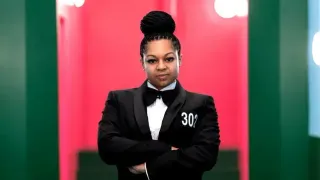
Nov 19
Henry Moodie’s Heart on Replay: How ‘Mood Swings’ Turned Queer Chaos into a Pop Anthem for a New Generation
READ TIME: 4 MIN.
Henry Moodie’s new record doesn’t just drop listeners into the deep end of their feels—it throws open the windows and invites everyone to dance, cry, and heal together. “Mood swings, ” the 14-track debut that’s been lighting up playlists and group chats alike, is more than a collection of breakup bops and bedroom ballads: it’s a living, breathing diary of queer youth, heartbreak, and the beautifully unpredictable process of growing into yourself.
At just 21, Moodie has already amassed a billion streams and a devoted online following—no small feat for someone who describes his early years as “fairly horrendous” thanks to relentless school bullying. “Music to me was like my therapy, ” Moodie told PinkNews. “I got bullied and I hated school and I would always go to the music block during breaks and lunch and write songs. It was my way of processing everything. To my core, songwriting is really why I do this. It’s my favourite thing in the world” .
But if “mood swings” is therapy, it’s the kind that doesn’t shy away from the real work—the awkward, exhilarating, and sometimes excruciating lessons of young queer love.
The heart of “mood swings” beats with the memories of a transformative queer relationship—what Moodie calls “a whole thing, ” with all the drama and delicacy that phrase suggests. “It’s almost made me understand myself on a deeper level, ” he said. “It really is the truest form of me as a songwriter” .
Across the album, Moodie traces the arc of first loves, situationships that went sideways, and relationships that leave a mark long after they end. Songs like “Cigarettes” and “Closure” are charged with the longing, anxiety, and possibility that come with embracing queer identity—not just as a lyrical device, but as the emotional core of the project.
In a pop landscape where queer stories are too often sanitized or universalized for mass appeal, Moodie’s refusal to obscure the specifics of his journey feels radical. “Being queer is a crazy experience because it’s this triangle of: ‘I like men. I’m also a bit scared of men. I also want to be accepted by men, ’” he quipped, capturing the push-pull of queer desire and fear with a wink and a wince.
“Mood swings” isn’t just Henry Moodie’s debut—it’s a coming-out party for queer vulnerability in pop. By naming and centering his experience, Moodie aligns himself with artists like Lil Nas X, Troye Sivan, and Janelle Monáe, who have helped carve out space for LGBTQ+ stories in mainstream music.
Moodie’s willingness to “capture the chaos, beauty, and heartbreak” of his own life signals a cultural turning point: fans and critics alike are hungry for pop that doesn’t filter out queer specificity for the sake of palatability. The album’s success across formats—LP, CD, cassette, and digital—shows that authenticity resonates, especially among listeners searching for their own stories in the music they love.
In interviews and on social media, Moodie has spoken candidly about the pressure to present as “universal, ” and the relief he’s found in embracing the messiness of being fully, unapologetically himself. “There’s definitely a part of me that wants to feel heard and finally seen because I didn’t really get that in school, ” he reflected.
The album’s queer resonance isn’t confined to its lyrics. In the video for “Closure, ” Moodie spotlights a queer relationship featuring transgender “Heartstopper” actress Bel Priestley—a deliberate choice in a time when the trans community faces heightened hostility online and off. “Trans people are my favourite people and it’s just a completely natural part of being a human that’s been around since the start of time. They deserve to be celebrated, ” Moodie explained. “That’s why I, in that music video, really wanted to express a trans relationship. I feel for all my trans friends. They’re going through a lot. They deserve to know how special and amazing they are” .
For LGBTQ+ fans, the visibility Moodie offers isn’t just a bonus—it’s a lifeline. The outpouring of support on platforms like Instagram and YouTube is testament to how many listeners see themselves in Moodie’s music and story. As one fan put it, “Henry Moodie writes the songs I wish I’d had when I was 16” .
Henry Moodie’s “mood swings” lands at a cultural moment when queer youth are searching for authenticity and connection in a world that too often demands resilience without offering recognition. Moodie’s candidness—about heartbreak, about the search for validation, about the tender chaos of queer love—offers a template for self-acceptance and hope.
His journey from bullied schoolboy scribbling lyrics in a music block to pop’s newest queer confidant is more than a personal triumph. It’s a reminder: the stories that save us are often the ones that dare to tell the truth, in all its wild, beautiful, and very queer glory.
As Moodie continues to evolve—artist, advocate, and Gen Z’s new poet laureate of heartbreak—one thing is clear: the queer kids are alright, and their soundtrack has never sounded better.






